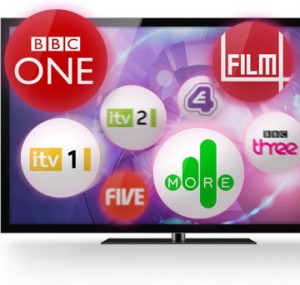Freeview: Consumers want TV evolution, not revolution
April 18, 2012
By Colin Mann
 In advance of the London 2012 Olympics, UK DTT platform Freeview has unveiled new consumer research which it suggests contain important reminders for the television industry, with the prospect of the Games representing a watershed for technologies such as 3DTV and Mobile TV.
In advance of the London 2012 Olympics, UK DTT platform Freeview has unveiled new consumer research which it suggests contain important reminders for the television industry, with the prospect of the Games representing a watershed for technologies such as 3DTV and Mobile TV.
The research of 2,000 people indicates that what consumers want most are technologies that enhance current television viewing behaviour and give the viewer a more personalised experience. When asked to rank eight different TV technologies in order of appeal, 62 per cent put catch up TV (player services) in the top slot, followed by TV anytime (59 per cent) and an enhanced programme guide (51 per cent).
3D viewing and Mobile TV, meanwhile, are considered less appealing but still “nice to have”, scoring 19 per cent and 12 per cent respectively. However, the Olympics could be a watershed for some of these new technologies.
Ilse Howling, Managing Director of Freeview, noted that eight years ago in Athens, the iPad and social media were unimagined, while the prospect of watching the 100m final in 3D at home was no more than a pipe dream. “London 2012 is gearing up to be a game changer for the television industry,” she suggested. “In eight years time, at the 2020 Olympics, who knows what the media landscape will look like. However, this research reminds the industry that what viewers want is more control of what they watch and when in an evolutionary, not revolutionary, way.”
Freeview notes a degree of similarity in the findings across age groups and those using devices such as the smartphone and tablet. Television appears to be a great leveller – for example, smartphone users score only 4 per cent higher in their response to the appeal of Mobile TV compared to the general average.
Freeview suggests that by the time of the 2016 Rio de Janeiro Olympics we should expect to see ‘new technology’ such as 3D and mobile TV become part of the mainstream consumer television essentials, but advises that in 2012 it is important for innovations in the television industry to adapt to the pace of the consumer, addressing what people want from their viewing experience – it will be a walk, not a sprint as we evolve this future viewing experience.
Howling said she was “absolutely certain” that no technology could succeed in the next decade without an appreciation of what the vast majority of viewers want. “However, in the melee of the television world, it’s often easy to get caught up in industry hype on the latest fad. We must make sure that technology isn’t running ahead of consumers in terms of what they actually want,” she advised.
“The clear message is that the innovations people like most are the ones which best fit with and improve the things they already do today. They like new things which offer an improvement rather than a major step change,” she concluded.
The roll out of Freeview HD will be completed in October. Currently, 81 per cent of the UK can receive the service; by the Olympics this will increase to 85 per cent and the whole country will be able to receive Freeview HD at the end of digital switchover, establishing a nationwide platform on which to develop these innovations for Freeview going forward.
Freeview has sold over 75 million products since it launched in 2002.
